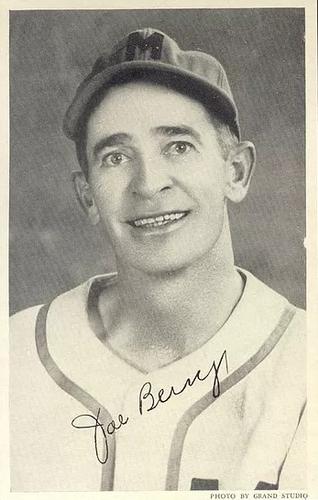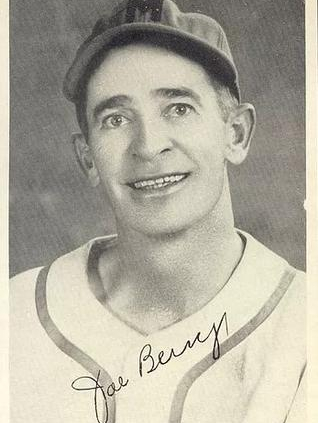July 21, 1945: Athletics, Tigers play to record setting 24-inning tie
 The Saturday matinee was a matchup between the first-place Detroit Tigers, who entered play with a three-game lead over the Washington Senators in a tightly contested American League pennant race, and the homestanding Philadelphia Athletics, who were mired in last place, 17½ games behind the Tigers.1 The 4,526 fans in attendance at Shibe Park that afternoon were treated to both one of the longest games in major-league history and one of the all-time great ironman pitching performances.
The Saturday matinee was a matchup between the first-place Detroit Tigers, who entered play with a three-game lead over the Washington Senators in a tightly contested American League pennant race, and the homestanding Philadelphia Athletics, who were mired in last place, 17½ games behind the Tigers.1 The 4,526 fans in attendance at Shibe Park that afternoon were treated to both one of the longest games in major-league history and one of the all-time great ironman pitching performances.
Les Mueller, a 26-year-old rookie who had been discharged from the US Army earlier in the year, drew the starting assignment for the visiting Tigers.2 The right-handed pitcher with a herky-jerky motion and heavy sinker-ball was making his ninth start of the season. He entered the game with a 3-4 record and a 4.75 ERA. Russ Christopher, a 27-year-old right-hander took the mound for the Athletics. Christopher, the ace of the Athletics’ rotation, was riding a personal four-game losing streak and entered the game with a record of 11-6 and a 3.48 ERA.
The game-time temperature was a steamy 90 degrees when Christopher delivered the first pitch at 3:00 P.M. under clear skies. Moments later, Tigers shortstop Skeeter Webb struck out for the first of 144 outs recorded that afternoon. Christopher held the Tigers hitless for the first four innings while Mueller also cruised through his first three frames, yielding only two singles.
The Athletics scored the game’s first run in the bottom of the fourth. With one out, Dick Siebert reached first when Tigers first baseman Rudy York threw wildly to Mueller, who was covering first on Siebert’s groundball. Bobby Estalella followed with a double to right field, advancing Siebert to third. Catcher Buddy Rosar singled to left field to plate Siebert with the Athletics’ only run of the afternoon. Bill McGhee followed with a walk to load the bases and, with one out and George Kell coming to the plate, the A’s had a golden opportunity to add to their lead. Kell sent a grounder to third baseman Bob Maier, who started a 5-4-3 inning-ending double play.3
The A’s threatened again in the sixth when Hal Peck and Estalella singled to put runners on first and second with one out. Mueller escaped the jam when he fanned Rosar and retired McGhee on a lineout to center field.
The Tigers tied the score in the top of the seventh with “a lucky run.”4 With one out, Roy Cullenbine worked Christopher for a walk and advanced to third when York laced a single to left-center. Doc Cramer then hit a groundball to Siebert that could have started a 3-6-3 double play, but the first baseman hesitated too long before he stepped on first base to get Cramer and threw home too late to get Cullenbine.
After the Tigers tied the score, the A’s mustered only one more threat against Mueller. Irv Hall opened the bottom of the 10th inning with a single to center but was erased at second when Peck hit into a fielder’s choice. After Siebert flied to right for the second out of the inning, Estalella followed with his fourth hit of the day, a single to left that moved Peck to second.5 Rosar followed with a sharp single to left, sending Peck around third with what appeared to be the go-ahead run. However, left fielder Jimmy Outlaw came up throwing and threw a perfect strike to Bob Swift to nail Peck at the plate and keep the score deadlocked at 1-1.
The Tigers mounted their own threat in the top of 11th. After they loaded the bases with two outs, York sent a drive to deep center that appeared headed for the bleachers. Estalella got a good jump on the ball and “just as it was about to hit the wall the Cuban jumped, caught the ball in his gloved hand and brought down the house.”6
The stalemate continued as Mueller and Christopher tossed one-two-three innings over the next 2½ frames. In the top of the 14th inning, the A’s 82-year old manager, Connie Mack, summoned 40-year-old right-hander Joe Berry to relieve Christopher, who had given up only five hits and struck out eight in his 13 innings of work. Mueller continued on for the Tigers, who were short of pitchers.
Looking back on the game, Tigers ace Hal Newhouser recalled, “Steve O’Neill would keep saying to (Mueller), ‘How are you doing?’ ‘Can you go another inning?’ Les would say he could. He was throwing as hard at the end as he was when he started!”7
Years later, Mueller reflectively reminisced on that afternoon. “I always kept hoping we’d get a run, and I’d get a win, but it didn’t work out that way,” he said.8 Indeed the Tigers failed to score the winning run while he was on the mound, and after Mueller walked two batters in the bottom of the 20th, the Tigers manager decided that 19⅔ innings were enough. Despite Mueller’s pleas to continue, O’Neill lifted him in favor of right-hander Dizzy Trout, who had pitched 4⅔ innings of relief in the first game of a doubleheader against Washington a day earlier.
With Berry tiring and beginning his eighth inning of work in the sweltering heat, the Tigers loaded the bases in the top of the 22nd when Cullenbine hit a one-out double and Berry walked York and Hank Greenberg, who had pinch-hit for Outlaw. “It did not seem that Berry, who was weary, and drenched with perspiration would be even able to get the ball to the plate,” observed a sportswriter.9 However, Berry dug deep and got Maier to fly out to McGhee.
The top of the 24th provided more drama to those fans who stayed for the entire game. A walk to Cullenbine, a single by Cramer, and a walk to 41-year-old Chuck Hostetler loaded the bases with one out.10 Once again, Berry rose to the occasion when he got Maier to hit a groundball to Busch at short who turned it into a neat 6-4-3 double play to keep the game tied at 1-1. Trout, aided by the twilight conditions, pitched an uneventful bottom of the 24th, wrapping up 4⅓ innings of scoreless relief.
Then, 4 hours and 48 minutes after the start of the game, umpire crew chief Bill Summers halted play as deep shadows engulfed the field. Although lights had been installed at Shibe Park in 1938, the rules of the day stated that no day game could be continued under the lights.11 Although the game ended as a 1-1 tie, the fans certainly got their money’s worth and “true to baseball traditions, they rose and stretched at the 7th, 14th and 21st innings.”12
The 24-inning marathon affair is tied for the fourth longest game (by innings) in major-league history and matched the longest game in American League and Philadelphia Athletics history.13 The time of the game, eclipsed the American League record by one minute.14
For Mueller, the game was a defining moment in a relatively short major-league career. While he finished the season with a 6-8 record and a 3.68 ERA in 34 games for the 1945 World Series champion Tigers, it was the 19⅔-inning pitching performance at Shibe Park for which he is best remembered. By 1946 he was back in the minors, never to make it back to the majors.
SOURCES
In addition to the sources cited in the Notes, the author consulted Baseball-Reference.com and Retrosheet.org
NOTES
1 Entering play on July 21, 1945, eight games separated the top seven teams in the American League.
2 Les Mueller appeared in four games with the Tigers in August and September of 1941.
3 Hall of Famer George Kell went 0-for 10 in the game.
4 Stan Baumgartner, “A’s Tie Own Mark; Umpire Halts Game,” Philadelphia Inquirer, July 22, 1945: 21-22.
5 Estalella went 5-for-10 for the Athletics in the game.
6 Baumgartner.
7 Jim Sargent, “Les Mueller,” SABR Bioproject, sabr.org/bioproj/person/58f0af66.
8 Sargent.
9 Baumgartner.
10 Chuck Hostetler had entered the game in the top of the 22nd as a pinch-runner for Hank Greenberg. Hostetler stayed in the game, replacing Outlaw in left field.
11 Baumgartner.
12 Baumgartner.
13 The most innings in a major-league game is 26. This happened on May 1, 1920, in a game between the Boston Braves and Brooklyn Robins. The game, like the game between the Tigers and Athletics, was called due to darkness and ended as a 1-1 tie. Almost 14 years earlier, on September 1, 1906, the Philadelphia Athletics beat the Boston Americans 4-1 in 24 innings at Columbia Park in Philadelphia. Jack Coombs pitched the entire 24 innings for the Athletics.
14 James Zerilli, “Trout Goes to Mueller’s Aid in 19th,” Detroit Free Press, July 22, 1945: 29.
Additional Stats
Philadelphia Athletics 1
Detroit Tigers 1
24 innings
Shibe Park
Philadelphia, PA
Box Score + PBP:
Corrections? Additions?
If you can help us improve this game story, contact us.


